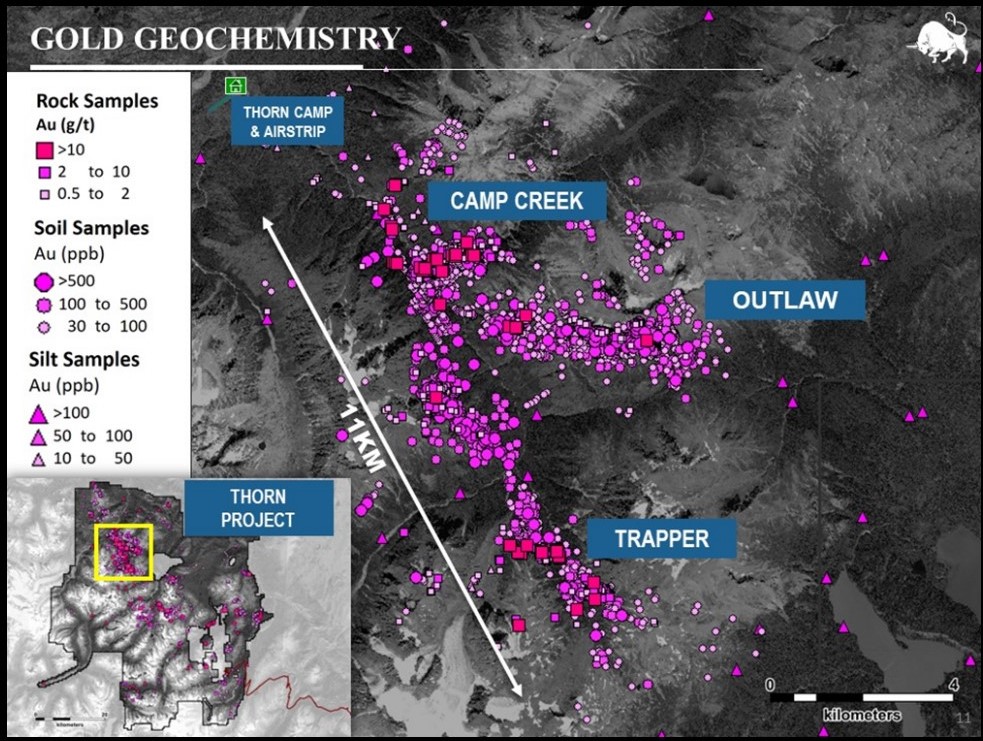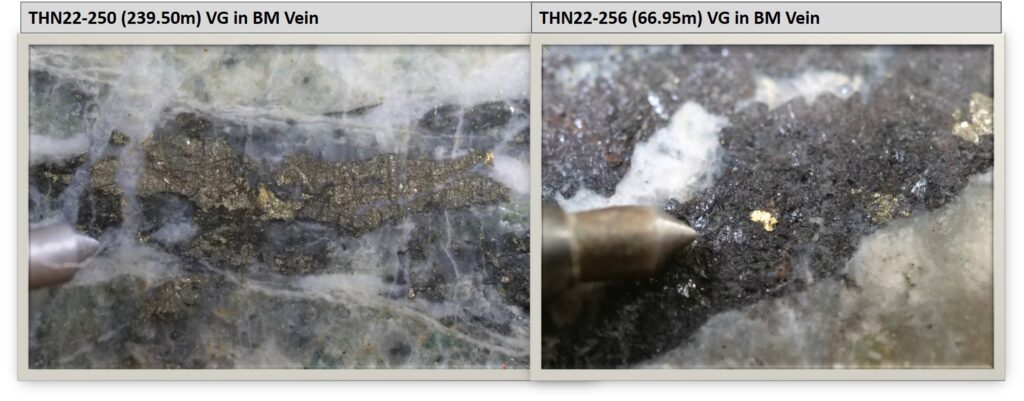January 12, 2023 – Brixton Metals Corporation (TSX-V: BBB, OTCQB: BBBXF) (the “Company” or “Brixton”) is pleased to announce additional and final 2022 drill results from the Trapper Gold Target at its wholly owned Thorn Project. The project is located in Northwest British Columbia within the Taku River Tlingit and Tahltan First Nation’s traditional territory.
Highlights
- Hole THN22-244 yielded 253.00m of 1.40 g/t Au from 42m depth
- Including 157.00m of 2.10 g/t Au
- Including 93.00m of 3.22 g/t Au
- Including 20.00m of 10.77 g/t Au
- Including 12.31m of 16.18 g/t Au
- Hole THN22-250 yielded 232.00m of 0.95 g/t Au from 9m depth
- Including 70.00m of 2.60 g/t Au
- Including 25.00m of 4.47 g/t Au
- Including 13.00m of 6.05 g/t Au
- Including 1.49m of 41.75 g/t Au
- Hole THN22-256 yielded 138.00m of 1.20 g/t Au
- Including 46.39m of 1.84 g/t Au
- Including 17.59m of 4.09 g/t Au
- Including 8.34m of 5.02 g/t Au
Vice President of Exploration, Christina Anstey, stated, “We are delighted with these final drill results from the 2022 program at the Trapper Gold Target, which confirms a significant new gold discovery. We are highly encouraged by the broad gold intercepts and high-grades drilled on the Trapper Gold Target to date. We look forward to reporting on the additional results from the Camp Creek and Metla Targets from the 2022 season.”
Figure 1. Gold Geochemistry and Trapper Target Location Map.

Table 1. Select Mineralized Intervals for the Trapper Target Drilling.

All assay values are uncut weighted averages and intervals reflect drilled lengths as further drilling is required to determine the true widths of the mineralization.
The 2022 program at the Trapper Gold Target totaled 9,119m of drilling. This News Release covers 1,972.68m of drilling and is the balance of the Trapper drilling results from 2022. Assays are pending for the remaining 9 drill holes, one from the Camp Creek Target and eight from the Metla Target, which will be released as they become available.
Figure 2. Collar Locations and Drill Traces at the Trapper Target.

Discussion
Gold mineralization at Trapper is structurally controlled, and northwest, east-west and northeast trends have been identified. Mineralization appears to favour the contact between the Cretaceous (85.2 +/- 1.2Ma) quartz diorite and the Triassic lapilli tuff volcanic rocks with broad gold intervals largely hosted within the quartz diorite unit. The gold is associated with silver and base metal veins as pyrite-galena-sphalerite +/- chalcopyrite +/- bornite. With the use of oriented core measurements, surface mapping, geochemistry and magnetics, the aim is to achieve predictability of the gold-bearing zones. The current drilling at the Trapper Target is located about 7km southeast from the Camp Creek Copper Porphyry Target. The Trapper Target at surface is expressed as a 4km northwest trending gold and zinc soil geochemical anomaly, which is part of the larger 11km gold geochemical anomaly as seen in Figure 1.
The 2022 Phase 2 drill campaign at Trapper was designed to test the southern and eastern extensions of the main mineralized trend, previously identified in 2021 and early 2022. Step-out drilling was planned through a combination of mapping, oriented core data, and soil geochemistry, where soil samples collected during the 2022 field season extended the gold and zinc soil anomaly to the south and east. Results from the 2022 drill program continue to demonstrate the potential for broad intercepts of near surface gold mineralization which remains open in all directions.
Figure 3. Cross Section of the Reported Gold Intercepts, Trapper Gold Target, Southwest View.

Drill hole THN22-244 was collared 76m south-southwest of THN22-209 (48.0m of 1.05 g/t Au at 12.0m depth) to test the down-dip extents of mineralization within broader intervals of quartz diorite and the contact with the lapilli tuff. The diorite and lapilli tuff have been identified as favorable hosts for gold-bearing mineralized structures at Trapper. The hole intersected the quartz diorite at 15.1 meters depth where intervals of base metal sulphide veins containing visible gold (Figure 4) were observed resulting in significant broad intercepts of gold mineralization. THN22-244 drilled at an azimuth of 24 degrees, a dip of -47 degrees, to a depth of 341.07m, assaying 253.00m of 1.40 g/t Au from 42m depth, including 157.00m of 2.10 g/t Au, including 93.00m of 3.22 g/t Au, including 20.00m of 10.77 g/t Au and including 12.31m of 16.18 g/t Au.
THN22-250 was drilled from the same pad as northbound hole THN22-205 (64.0m of 5.74g/t Au) at an azimuth of 28 degrees, and a dip of -55 to test the continuity of mineralization to the east of THN22-205. THN22-250 was drilled to a depth of 321.86m and intercepted 232.00m of 0.95 g/t Au, including 70.00m of 2.60 g/t Au including 25.00m of 4.47 g/t Au, including 13.00m of 6.05 g/t Au including 4.00m of 10.41 g/t Au and including 1.49m of 41.75 g/t Au (Figure 5).
Drill hole THN22-256 was drilled from the same pad as previously released holes THN22-257 and THN22-254, located 50m east of THN22-237. The pad location was planned to test the southeast extension of the projected diorite-lapilli tuff contact and the main mineralized trend interpreted from soil geochemistry and oriented drill core data. THN22-256 was drilled at an azimuth of 8 degrees, a dip of -57, and to a depth of 145.08m. THN22-256 intercepted the quartz diorite at surface with grades of 138.00m of 1.20 g/t Au, including 46.39m of 1.84 g/t Au, including 17.59m of 4.09g/t Au and including 8.34m of 5.02 g/t Au.
Figure 4. Visible Gold Photographs of HQ core from hole THN22-244.

Figure 5. Visible Gold Photographs of HQ core from holes THN22-250 and THN22-256.

THN22-220 was drilled at an azimuth of 348 degrees, a dip of -55 degrees and to a depth of 352.04m, collared 37m east of THN21-186 (139.0m pf 2.14g/t Au), testing the mineralization continuity in that direction. Hole 220 intercepted 322.33m of 0.33 g/t Au, including 121.00m of 0.72 g/t Au including 61.00m of 1.08 g/t Au, including 28.00m of 2.12 g/t Au and including 7.00m of 7.72 g/t Au. THN22-222 was drilled down-dip of THN22-220 at a dip of -71 degrees and to a depth of 243.23m, returning 221.73m of 0.41 g/t Au, including 58.00m of 0.77 g/t Au, including 23.00m of 1.23 g/t Au, and including 3.00m of 6.34 g/t Au.
THN22-240 was drilled down-dip of THN22-237 at an azimuth of 26 degrees, a dip of -63 degrees, to a depth of 213.09m and intercepted 110.00m of 0.32 g/t Au, including 27.73m of 0.63 g/t Au and including 9.00m of 1.03 g/t Au.
THN22-238 was the easternmost hole drilled at the Trapper Target this season, setup 60m east-southeast of hole THN22-256. THN22-238 was drilled at an azimuth of 24 degrees, a dip of -47 degrees and to a depth of 181.36m and returned 135.50m of 0.20 g/t Au, including 7.30m of 0.87 g/t Au, demonstrating that the gold mineralization continues eastward.
THN22-253 was part of a series of holes drilled from the THN22-256 pad, testing the down-dip and eastern extents of the mineralized trend at an azimuth of 25 degrees, a dip of -65 degrees and total depth of 32.31m, which returned 25.31m of 1.18 g/t Au.
THN22-242 was a northbound hole drilled from the same pad as THN22-244, down-dip of THN22-241 (198.0m of 0.74g/t Au). The hole did not intersect the quartz diorite and returned insignificant results.
Table 2. Additional Select Reported Mineralized Intervals for the Trapper Target Drilling.

All assay values are uncut weighted averages and intervals reflect drilled lengths as further drilling is required to determine the true widths of the mineralization.
Drilling Information
Table 3. Drill Collar and Hole Information of Current News Release.

About the Trapper Gold Target
The geochemical footprint for the Trapper Gold Target was expanded in 2021 to 4km by 1.5km. The gold-in-soil geochemical signature has a strong positive correlation to zinc and lead. The Trapper Target represents a volcanic and intrusive hosted gold target. The volcanics are Triassic Stuhini lapilli tuff and at least two intrusive phases have been identified as diorite and quartz diorite. Age-dating for the mineralized intrusive is Cretaceous of 85.2Ma +- 1.2Ma. Visible gold has been identified in core and surface outcrops across the Trapper Target area. Rock grab samples have returned up to 135 g/t Au. Visible gold is recognized in several environments: within base metal-veins-veinlets (sphalerite-galena-pyrite-chalcopyrite), quartz-stockwork, sulphosalt-pyrite veinlets, and disseminated gold in the diorite. In 2022, Brixton drilled 9,119m. In 2021, Brixton drilled 3,107m. In 2011, forty-two drill holes were completed by a previous operator, totaling 8,581m, where drill hole TG11-11 returned 32.64m of 1.78 g/t Au including 0.41m of 92.8 g/t Au with visible gold. The Trapper Target is royalty free.
Quality Assurance & Quality Control
Quality assurance and quality control protocols for drill core sampling was developed by Brixton. Core samples were mostly taken at 1.0m intervals. Blank, duplicate (lab pulp) and certified reference materials were inserted into the sample stream for at least every 20 drill core samples. Core samples were cut in half, bagged, zip-tied and sent directly to ALS Minerals preparation facility in Whitehorse, Yukon. Some shipments were re-directed to the ALS preparation facility in Winnipeg to improve assay turn around time. ALS Minerals Laboratories is registered to ISO 9001:2008 and ISO 17025 accreditations for laboratory procedures. Samples were analyzed at ALS Laboratory Facilities in North Vancouver, British Columbia for gold by fire assay with an atomic absorption finish, whereas Ag, Pb, Cu and Zn and 48 additional elements were analyzed using four acid digestion with an ICP-MS finish. Over limits for gold were analyzed using fire assay and gravimetric finish. The standards, certified reference materials, were acquired from CDN Resource Laboratories Ltd., of Langley, British Columbia and the standards inserted varied depending on the type and abundance of mineralization visually observed in the primary sample. Blank material used consisted of non-mineralized siliceous landscaping rock. A copy of the QAQC protocols can be viewed at the Company’s website.
About the Thorn Project
The wholly-owned 2,900 square kilometer Thorn Project is located in British Columbia, Canada, approximately 90 km northeast of Juneau, AK. The southern limit of the Thorn claim boundary is roughly 50 km from tide water. The Thorn Project hosts a district-scale 80km trend of Triassic to Eocene, volcano-plutonic complex and related sedimentary units with several styles of mineralization related to porphyry and epithermal environments. Fourteen large-scale copper-gold targets have been identified for further exploration work. Information on each of the targets may be found at the following link: https://brixtonmetals.com/thorn-gold-copper-silver-project/
Qualified Person
Mr. Gary R. Thompson, P.Geo., is Chief Executive Officer for the company and a qualified person as defined by National Instrument 43-101. Mr. Thompson has verified the data disclosed in this press release, including the sampling, analytical and test data underlying the information and has approved the technical information in this press release.
About Brixton Metals Corporation
Brixton Metals is a Canadian exploration company focused on the advancement of its mining projects. Brixton wholly owns four exploration projects: Brixton’s flagship Thorn copper-gold-silver-molybdenum Project, the Atlin Goldfields Projects located in NW BC (now under Option to Pacific Bay Minerals (TSXV: PBM), the Langis-HudBay silver-cobalt-nickel Project in Ontario, and the Hog Heaven copper-silver-gold Project in NW Montana, USA (under option to Ivanhoe Electric Inc. NYSE: IE). Brixton Metals Corporation shares trade on the TSX-V under the ticker symbol BBB, and on the OTCQB under the ticker symbol BBBXF. For more information about Brixton, please visit our website at brixtonmetals.com.
On Behalf of the Board of Directors
Mr. Gary R. Thompson, Chairman and CEO
Tel: 604-630-9707 or email: info@brixtonmetals.com
—
For Investor Relations, please contact:
Neil MacRae, Investor Relations
Tel: 604-630-9707 or email: neil.macrae@brixtonmetals.com
Neither the TSX Venture Exchange nor its Regulation Services Provider (as that term is defined in the policies of the TSX Venture Exchange) accepts responsibility for the adequacy or accuracy of this release.
Information set forth in this news release may involve forward-looking statements under applicable securities laws. Forward-looking statements are statements that relate to future, not past, events. In this context, forward-looking statements often address expected future business and financial performance, and often contain words such as “anticipate”, “believe”, “plan”, “estimate”, “expect”, and “intend”, statements that an action or event “may”, “might”, “could”, “should”, or “will” be taken or occur, including statements that address potential quantity and/or grade of minerals, potential size and expansion of a mineralized zone, proposed timing of exploration and development plans, or other similar expressions. All statements, other than statements of historical fact included herein including, without limitation, statements regarding the use of proceeds. By their nature, forward-looking statements involve known and unknown risks, uncertainties and other factors which may cause our actual results, performance or achievements, or other future events, to be materially different from any future results, performance or achievements expressed or implied by such forward-looking statements. Such factors include, among others, the following risks: the need for additional financing; operational risks associated with mineral exploration; fluctuations in commodity prices; title matters; and the additional risks identified in the annual information form of the Company or other reports and filings with the TSXV and applicable Canadian securities regulators. Forward-looking statements are made based on management’s beliefs, estimates and opinions on the date that statements are made and the Company undertakes no obligation to update forward-looking statements if these beliefs, estimates and opinions or other circumstances should change, except as required by applicable securities laws. Investors are cautioned against attributing undue certainty to forward-looking statements.
